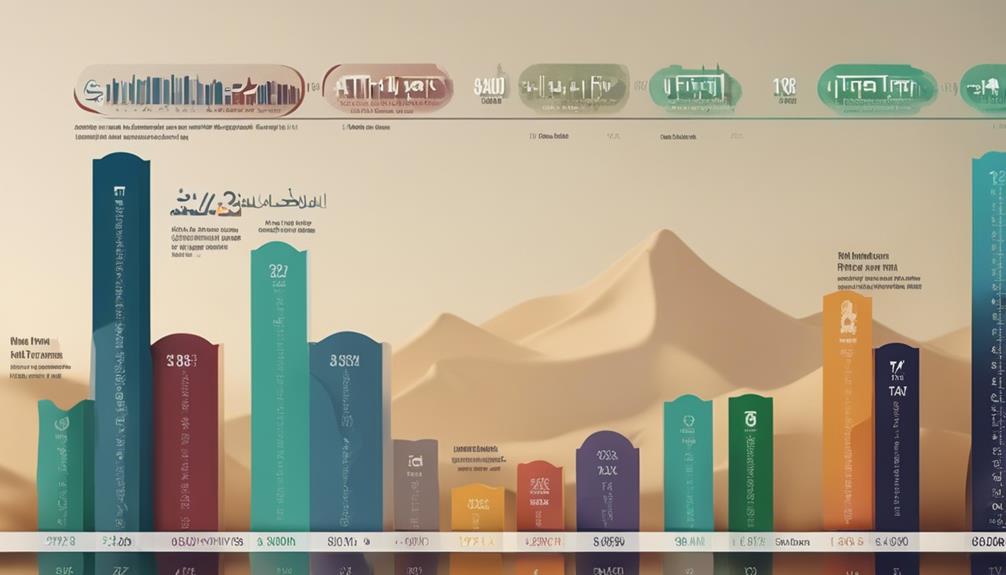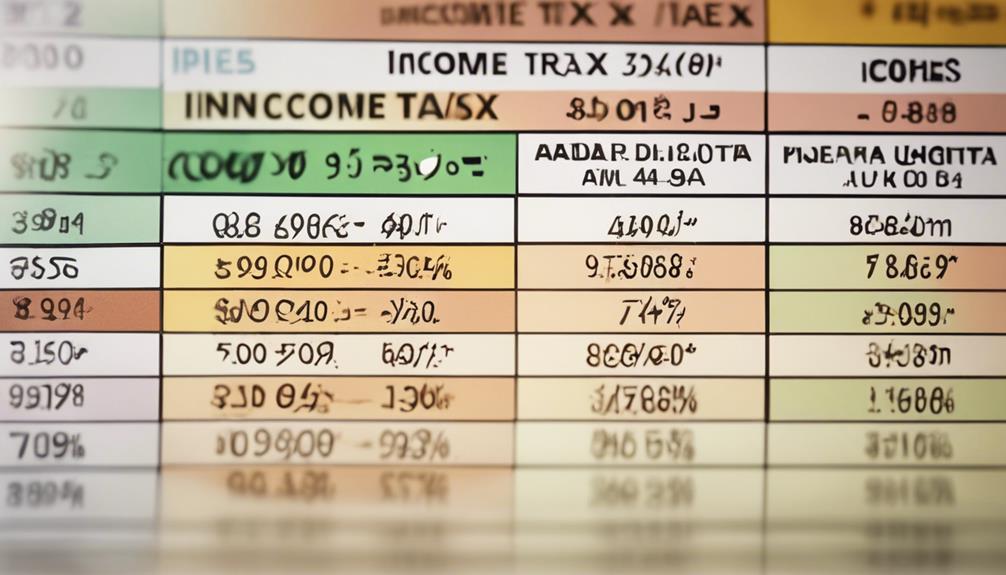The labyrinth of tax rates in Saudi Arabia is a subject often shrouded in complexity and speculation. Understanding the nuances of the taxation system in the Kingdom can be pivotal for both individuals and businesses operating within its borders.
From individual income tax rates to corporate tax structures, demystifying the intricacies of Saudi Arabia’s tax regime is a journey that unveils a landscape of regulations and incentives that can significantly impact financial decisions.
By unraveling these layers, a clearer picture emerges, shedding light on the opportunities and challenges that come with navigating the tax landscape in Saudi Arabia.
Overview of Taxation System

In Saudi Arabia, the taxation system is characterized by its reliance on indirect taxes such as value-added tax (VAT) and excise tax. Taxation regulations in the country play a vital role in shaping the business landscape and investment opportunities. Understanding the tax framework is essential for both local businesses and foreign investors looking to capitalize on the various sectors within the Saudi economy.
The taxation regulations in Saudi Arabia are designed to attract foreign investment while also ensuring a stable revenue stream for the government. By offering incentives and tax breaks in certain industries, the government aims to stimulate economic growth and diversification. This approach creates opportunities for investors to explore sectors such as renewable energy, technology, and manufacturing.
Navigating the tax system in Saudi Arabia requires a comprehensive understanding of the regulations in place. With the right knowledge and strategic planning, businesses can leverage the tax framework to optimize their operations and maximize profitability in the Kingdom’s dynamic market.
Types of Taxes in Saudi Arabia
The tax regime in Saudi Arabia encompasses various types of taxes that play a crucial role in shaping the economic landscape and investment environment of the country. Some of the key types of taxes in Saudi Arabia include Zakat, which is an Islamic tax on wealth and is mandatory for all eligible Muslims to pay. Value-Added Tax (VAT) was introduced in 2018 at a standard rate of 5% on goods and services. Additionally, there are taxes on expatriate workers, such as the expatriate levy, which is imposed on companies employing foreign nationals. Corporate income tax is another significant tax in Saudi Arabia, with a standard rate of 20%.
Effective tax administration is essential for ensuring tax compliance and collecting revenues to support the government’s activities and services. The Saudi Arabian tax system is overseen by the General Authority of Zakat and Tax (GAZT), which is responsible for tax collection, enforcement, and implementing tax policies. GAZT plays a vital role in promoting tax compliance among individuals and businesses operating in the country.
Individual Income Tax Rates

Amidst the tax landscape of Saudi Arabia, individual income tax rates hold a pivotal position in determining the financial obligations of residents. Saudi Arabia operates a progressive tax system for individuals, with tax rates varying based on income levels. As of the latest regulations, the country has tax brackets ranging from 0% to 30% for different income ranges. Tax brackets refer to the specific ranges of income subject to a certain tax rate.
Moreover, individuals in Saudi Arabia can benefit from various tax deductions to reduce their taxable income. Common tax deductions include expenses related to education, healthcare, and charitable contributions. By utilizing these deductions effectively, individuals can lower their overall tax liability. It is essential for residents to understand the tax brackets applicable to their income level and leverage available deductions to optimize their tax situation.
Being aware of the individual income tax rates, brackets, and deductions can help individuals effectively plan their finances and comply with Saudi Arabia’s tax regulations.
Corporate Tax Rates Explained
Corporate Tax in Saudi Arabia play a crucial role in shaping the financial obligations of businesses operating within the country. As of now, the standard corporate tax rate in Saudi Arabia is 20% on the net income of resident and non-resident companies. However, certain industries may have different tax rates based on specific regulations.
In Saudi Arabia, there are corporate exemptions available to encourage investment and economic growth. These exemptions may include tax breaks for companies operating in specific sectors or regions. Additionally, tax credits are offered to businesses to reduce their tax liability and incentivize activities that benefit the economy.
Understanding corporate tax rates, exemptions, and tax credits is essential for businesses in Saudi Arabia to effectively manage their finances and remain compliant with the tax regulations. By taking advantage of available exemptions and tax credits, companies can optimize their tax planning strategies and enhance their overall financial performance in the Saudi Arabian market.
Tax Incentives and Exemptions

Exploring the myriad tax incentives and exemptions available in Saudi Arabia sheds light on the strategic advantages they offer to businesses seeking to optimize their financial operations. Saudi Arabia provides various tax incentives to attract foreign investment and promote economic growth. One of the key incentives is the availability of tax credits for businesses that invest in specific sectors designated for development. These tax credits can significantly reduce the overall tax burden for companies, making Saudi Arabia an attractive destination for investment opportunities.
Moreover, the government offers exemptions on certain types of income, such as dividends and capital gains, to encourage investment in the country. By providing these exemptions, Saudi Arabia aims to foster a conducive business environment that stimulates economic activity and attracts foreign investors. These incentives and exemptions play a crucial role in shaping the tax landscape of Saudi Arabia, making it a competitive market for businesses looking to establish a presence in the region while maximizing their financial returns.
Frequently Asked Questions
How Do Tax Rates in Saudi Arabia Compare to Other Countries in the Region?
When comparing tax rates in Saudi Arabia to other countries in the region, it is crucial to consider the regional variations in tax implications. Understanding these differences can provide valuable insights for businesses and individuals operating across borders.
Are There Any Recent Changes in Tax Policies That Individuals and Companies Should Be Aware Of?
Recent changes in tax policies can have a significant impact on the economy. Individuals and companies should stay informed to adapt effectively. Understanding the implications of these changes is crucial for financial planning and compliance.
What Are the Penalties for Tax Evasion in Saudi Arabia?
Legal consequences for tax evasion in Saudi Arabia are severe, including hefty fines and potential imprisonment. Preventive measures involve ensuring corporate responsibility, strict compliance with tax laws, and accurate reporting to avoid penalties and maintain a good standing.
Are There Any Specific Tax Deductions or Credits Available for Certain Industries in Saudi Arabia?
Tax incentives and industry-specific deductions in Saudi Arabia can provide relief for businesses. Tax credits may vary among sectors. Understanding these provisions can optimize tax planning. Regular updates on tax policy ensure compliance and benefit from available deductions.
How Does the Saudi Arabian Government Use Tax Revenue to Fund Public Services and Infrastructure Projects?
The Saudi Arabian government utilizes tax revenue to support economic development by funding public services and infrastructure projects. This financial source contributes to enhancing social welfare by providing essential services and amenities for the population.
Conclusion
In conclusion, the taxation system in Saudi Arabia is composed of individual income taxes and corporate taxes. Individual income tax rates vary depending on the income bracket, while corporate tax rates are set at a flat rate.
Additionally, there are tax incentives and exemptions available to encourage investment and economic growth in the country. Understanding these tax rates and incentives is essential for individuals and businesses operating in Saudi Arabia to comply with the tax regulations and maximize their financial benefits.










